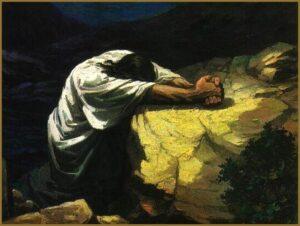As we prepare to celebrate Jesus’ resurrection, our thoughts should also involve the events leading up to it as well. It is impossible to have a resurrection without a death and that’s why we must pause at the cross before rushing to the empty tomb.
Looking ahead 800 years to Good Friday, Isaiah prophesied, “Surely He took up our infirmities and carried our sorrows…He was crushed for our iniquities; the punishment that brought us peace was upon Him, and by His wounds we are healed… The Lord has laid on Him the iniquity of us all.” (Isaiah 53:4-6)
While that crushing weight bore down upon Him on the cross, He began to feel it the night before in the Garden. The Aramaic word “Gethsemane” literally means olive press and since Jesus and His disciples had gathered in an olive grove that night, it’s very likely that one of these was nearby.
There were two different models of presses designed to extract this life-giving oil from these fruits. The first was a circular stone base upon which the olives were laid while a stone wheel ran around on top, crushing them in between. The oil drained through an opening and was collected for use.
The other model required the olives be placed in round collapsible wicker baskets which were laid on top of each other over a stone base with a hole in the center. Another large stone was placed on top and a beam was lowered onto that. One end of the beam was fixed at a pivot point and stone weights were added to the other end causing it to bear down on the top stone and thus on the olives in the baskets beneath. As the oil was squeezed out, it drained into the center hole and was collected below. Either method caused great stress to the olives and resulted in only lifeless pulp being left behind.
It’s no accident that Jesus knelt near one of these devices, for at that very hour He was being crushed between man’s sin and God’s justice as those two unrelenting stones came together. The weight of the world’s sin was grinding Him against the unyielding righteousness of His Holy Father. Knowing what would happen to Him over the next 18 hours, Jesus knelt there to pray.
The burden applied to the end of His beam increased exponentially as the weight of all our sins was loaded on. Each of our sins was added, one after the other, until those of all humanity from Adam onward were hanging on the beam like so many stones. Imagine the sheer crushing force His soul endured that night in Gethsemane. The burden that was impossible for us to bear was taken up by the One who added nothing to it. He had committed not one offense nor contributed even a hair’s heaviness to His awful affliction.
The great pressure squeezed the very blood out of His pores as He sweat great drops of it that night. It’s no wonder He was deeply distressed and troubled as Mark reports and agonized in prayer saying, “My soul is overwhelmed with sorrow to the point of death.” It’s no wonder He asked the Father to spare Him this cup and to let Him out of the press.
“Nevertheless,” He prayed, “Not my will but Thine be done.” And shortly thereafter He willingly went with those who arrested Him, endured the humiliating trials, suffered excruciating flogging, and died upon the cross so that every soul could be forgiven and saved from eternal hell. The olive that entered Gethsemane’s press that night gave His last drop of oil the next day on the cross when he gave up the ghost.
Why would He do such a thing? Why would His loving Father require it? The answer is most clearly seen in John 3:16, “For God so loved the world that He gave His only begotten Son, that whosoever believes in Him should not perish, but have everlasting life.”
As you ponder Jesus’ sacrificial death, receive the forgiveness He offers and thank Him for His willingness to bear your sin weight and to have the life crushed out of Him so that you might live forever.
Eternally grateful, George